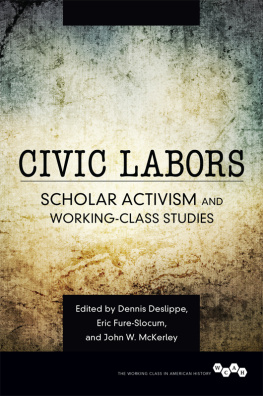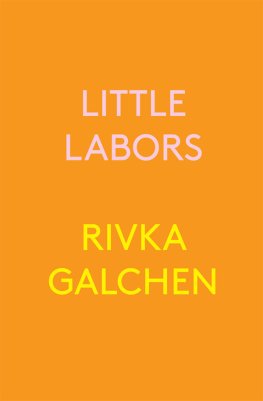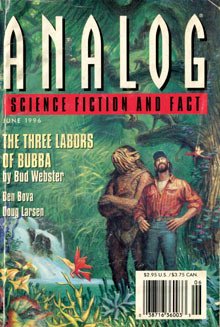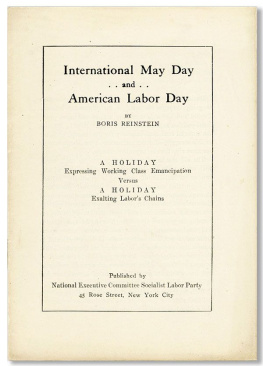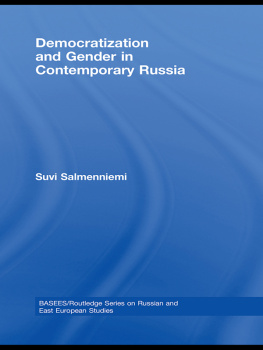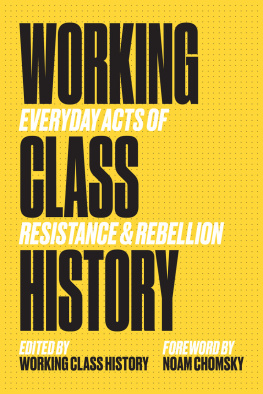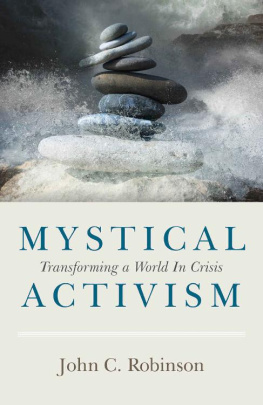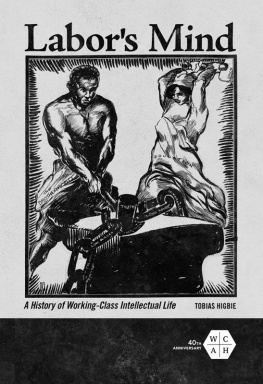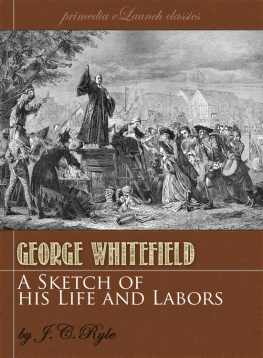CIVIC LABORS
THE WORKING CLASS IN AMERICAN HISTORY
Editorial Advisors
James R. Barrett, Julie Greene, William P. Jones,
Alice Kessler-Harris, and Nelson Lichtenstein
A list of books in the series appears at the end of this book.
Civic Labors
Scholar Activism
and Working-Class Studies
Edited by
DENNIS DESLIPPE,
ERIC FURE-SLOCUM,
AND JOHN W. MCKERLEY
With associate editors
KRISTEN ANDERSON,
MATTHEW M. METTLER,
AND JOHN WILLIAMS-SEARLE
Publication supported by a grant from Franklin & Marshall College.
2016 by the Board of Trustees
of the University of Illinois
All rights reserved
1 2 3 4 5 C P 5 4 3 2 1

This book is printed on acid-free paper.
Library of Congress Cataloging-in-Publication Data
Names: Deslippe, Dennis, editor. | McKerley, John W., editor. | Fure-Slocum, Eric Jon, editor.
Title: Civic labors : scholar activism and working-class studies / edited by Dennis Deslippe, Eric Fure-Slocum, and John W. McKerley with associate editors Kristen Anderson, Matthew M. Mettler, and John Williams-Searle.
Description: Urbana : University of Illinois Press, 2016. | Series: Working class in American history | Includes bibliographical references and index.
Identifiers: lccn 2016015343 (print) | lccn 2016038411 (ebook) | isbn 9780252040498 (hbk) | isbn 9780252081965 (pbk) | isbn 9780252098932 (E-book)
Subjects: LCSH: Working classHistoryStudy and teachingUnited States. | Working classResearchUnited States. | Political activistsUnited States. | BISAC: POLITICAL SCIENCE / Labor & Industrial Relations. | BUSINESS & ECONOMICS / Labor. | EDUCATION / Organizations & Institutions.
Classification: lcc hd4824.5.u5 c58 2016 (print) | lcc hd4824.5.u5 (ebook) | ddc 305.5/620973dc23
LC record available at https://lccn.loc.gov/2016015343
To David Montgomery (19272011), Paul Young (19462012),
and Jake Hall (19742014), who embodied the ideals
of engaged scholarship and continue to inspire
CONTENTS
Dennis Deslippe, Eric Fure-Slocum, and John W. McKerley
Shelton Stromquist
John Williams-Searle
Ralph Scharnau
Daniel E. Atkinson
Stephen Meyer
Michael Innis-Jimnez
Sam Davies
Matthew M. Mettler
James R. Barrett
Peter Rachleff
Susan Roth Breitzer
Jennifer Sherer
Emily E. LB. Twarog
Kristen Anderson
Joseph A. McCartin
Colin Gordon
Susan Chandler
Kim E. Nielsen
Stephanie Luce
David Montgomery
ACKNOWLEDGMENTS
Shel Stromquist made this book possible. He brought us together and continues to do so. Shels tireless activism, his scholarly integrity, and his generosity are legendary. Ann Stromquists ongoing support and the presence of Shel and Anns family at the Working-Class Worlds conference made this an especially memorable gathering.
We are grateful to Laurie Matheson for taking an early interest in this collection and shepherding it into the University of Illinois Presss series, the Working Class in American History. Leon Fink, as well as Jennifer Luff and a second anonymous reader for the press, offered perceptive comments and suggestions that strengthened this book. Michael K. Honey and Erik Gellman demonstrated the qualities of solidarity and collegiality in their kind assistance during the copy-editing phase. Thanks to Marika Christofides and Jennifer Clark at the press and to Deborah Oliver, this books skilled copyeditor. We also appreciate support from David Montgomerys familythe late Martel Montgomery, Edward Montgomery, and Claude Montgomeryto include the epilogue to this volume. The Office of College Grants at Franklin & Marshall College stepped in to help fund this books publication; St. Olaf College and the University of Iowa History Department also provided much needed funding.
The editors, associate editors, and many of the contributors to this volume first joined together at the Working-Class Worlds: Local and Global Perspectives on Labor History conference, held in Iowa City during the summer of 2011 in honor of Shel Stromquist. Other conference participants who we thank include Bradley Bowen, Cecelia Bucki, Robert Cherny, John Enyeart, Leon Fink, Lionel Kimble, Greg Patmore, David Roediger, Steve Rosswurm, Kerry Taylor, Roberta Till-Retz, and Sharon E. Wood. Linda K. Kerber deserves a special note of gratitude for her well-chosen words at the conference and for her encouragement throughout this process. Colin Gordon and Pat Goodwin in the University of Iowa History Department provided key logistical assistance. A host of sponsors and supporters were crucial in bringing the event to fruition: the University of Iowa History Department, the Center for Recent United States History, the University of Iowa Labor Center, the Obermann Center for Advanced Studies, the State Historical Society of Iowa, the Herbert Hoover Presidential Library and Museum, both the associate dean of humanities and the History Department at St. Olaf College, and Prairie Lights Books.
For support and patience throughout the years of conference organizing and editing, Eric is thankful especially to Carolyn, Anna, and Jacob. At the conference, Anna also helped with photography and Jacob produced podcasts of the sessions. For Dennis, Alison Kibler, Therese Deslippe, and John Deslippe were sympathetic listeners to countless descriptions of engaged scholarship. John would like to thank his wife, Heather, and daughters, Charlotte and Eleanor. Working on this project has made him more aware than ever of the struggles and contradictions of pursuing scholarship or activism aimed at broad-based social justice while striving to do justice to the people closest to home.
CIVIC LABORS
INTRODUCTION
Challenges of Engaged Scholarship and Teaching
Dennis Deslippe, Eric Fure-Slocum, and John W. McKerley
In a February 2014 column in the New York Times , writer Nicholas Kristof revived a decades-old plea for the rise of a new generation of academics engaged in public life.
A diverse group of academics quickly responded. More often than not, they rejected Kristof s premise that scholars had retreated behind the walls of ivory towers. Instead, they replied with a bevy of contemporary examples of scholarly engagement and challenged Kristof s implication that our current moment reflected a retreat from a golden age of public intellectuals. Moreover, while several academics pointed out that Kristof s implied definition of public intellectual referred to an exclusive and top-down model, many others directed readers to the large number of people with academic backgrounds writing for popular publications as well as blogging under their own names or pseudonyms. Several more pointed beyond writing to teaching as scholars most common act of engagement, and a few suggested that acts outside the scope of scholarly laborfor example, walking on a picket lineconstituted important forms of engagement as well. As for the roots of resistance to engagement, Kristof s critics tended to focus more
Although much of Kristof s column arguably reflected a rather limited understanding of the lives of modern academics, scholars reactions to it revealed a degree of defensiveness that suggested he had struck a little too close to home. At the very least, Kristof and his critics revealed both a widespread interest in some form of engaged activity as well as a sense that academic engagement or activismwhile an important motivating force in many scholars livesremained a source of tension for people both within and outside academe. Indeed, over the past several decades, scholar-activists from a variety of traditions have written articles and books, including several collections of essays, wrestling with the relationship between scholarship and activism. The authors of these works, not surprisingly, have tended to be drawn largely from the ranks of anthropology, sociology, and critical race and gender studies, whose practitioners have often taken up these issues out of methodological or disciplinary necessity as well as the demands of activism (including, at times, personal experiences as marginalized people). In particular, these studies have been important for moving beyond the seeming contradictions of combining activism with an academic career to highlight examples of activist teaching and scholarship, and, importantly, turning a critical eye to the power relationships that exist in the academic workplace.

 This book is printed on acid-free paper.
This book is printed on acid-free paper.
